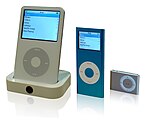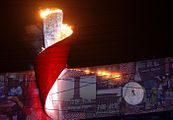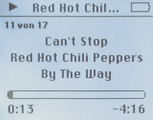2000s
The 2000s (pronounced "two-thousands"; shortened to the '00s and known as the aughts or noughties) was a decade that began on January 1, 2000, and ended on December 31, 2009.
For other uses, see 2000s (disambiguation).
The early part of the decade saw the long predicted breakthrough of economic giants in Asia, like India and China, which had double-digit growth during nearly the whole decade. It is also benefited from an economic boom, which saw the two most populous countries becoming an increasingly dominant economic force. The rapid catching-up of emerging economies with developed countries sparked some protectionist tensions during the period and was partly responsible for an increase in energy and food prices at the end of the decade. The economic developments in the latter third of the decade were dominated by a worldwide economic downturn, which started with the crisis in housing and credit in the United States in late 2007 and led to the bankruptcy of major banks and other financial institutions. The outbreak of this global financial crisis sparked a global recession, beginning in the United States and affecting most of the industrialized world.
The decade saw the rise of the Internet, which grew from covering 6.7% to 25.7% of the world population. This contributed to globalization during the decade, which allowed faster communication among people around the world;[1][2][3][4][5] social networking sites arose as a new way for people to stay in touch from distant locations, as long as they had internet access. Myspace was the most popular social networking website until June 2009, when Facebook overtook it in number of American users. Email continued to be popular throughout the decade and began to replace "snail mail" as the primary way of sending letters and other messages to people in distant locations. Google, YouTube, Ask.com and Wikipedia emerged to become among the top 10 most popular websites. Amazon overtook eBay as the most-visited e-commerce site in 2008. AOL significantly declined in popularity throughout the decade, falling from being the most popular website to no longer being within the top 10. Excite and Lycos fell outside the top 10, and MSN fell from the second to sixth most popular site, though it quadrupled its monthly visits. Yahoo! maintained relatively stable popularity, remaining the most popular website for most of the decade.
The war on terror and War in Afghanistan began after the September 11 attacks in 2001. The International Criminal Court was formed in 2002. In 2003, a United States-led coalition invaded Iraq, and the Iraq War led to the end of Saddam Hussein's rule as Iraqi President and the Ba'ath Party in Iraq. Al-Qaeda and affiliated Islamist militant groups performed terrorist acts throughout the decade. The Second Congo War, the deadliest conflict since World War II, ended in July 2003. Further wars that ended included the Algerian Civil War, the Angolan Civil War, the Sierra Leone Civil War, the Second Liberian Civil War, the Nepalese Civil War, and the Sri Lankan Civil War. Wars that began included the conflict in the Niger Delta, the Houthi insurgency, and the Mexican drug war.
Climate change and global warming became common concerns in the 2000s. Prediction tools made significant progress during the decade, UN-sponsored organizations such as the IPCC gained influence, and studies such as the Stern Review influenced public support for paying the political and economic costs of countering climate change. The global temperature kept climbing during the decade. In December 2009, the World Meteorological Organization (WMO) announced that the 2000s may have been the warmest decade since records began in 1850, with four of the five warmest years since 1850 having occurred in this decade. The WMO's findings were later echoed by the NASA and the NOAA. Major natural disasters included Cyclone Nargis in 2008 and earthquakes in Pakistan and China in 2005 and 2008, respectively. The deadliest natural disaster[a] and most powerful earthquake of the 21st century occurred in 2004 when a 9.1–9.3 Mw earthquake and its subsequent tsunami struck multiple nations in the Indian Ocean, killing 230,000 people.[6]
Usage of computer-generated imagery became more widespread in films produced during the 2000s, especially with the success of 2001's Shrek and 2003's Finding Nemo, the latter becoming the best-selling DVD of all time. Anime films gained more exposure outside Japan with the release of Spirited Away. 2009's Avatar became the highest-grossing film. Documentary and mockumentary films, such as March of the Penguins, Super Size Me, Borat and Surf's Up, were popular in the 2000s. 2004's Fahrenheit 9/11 by Michael Moore was the highest grossing documentary of all time. Online films became popular, and conversion to digital cinema started. Video game consoles released in this decade included the PlayStation 2, the Xbox, the GameCube, the Wii, the PlayStation 3 and the Xbox 360; while portable video game consoles included Game Boy Advance, Nintendo DS and PlayStation Portable. Wii Sports was the decade's best-selling console video game, while New Super Mario Bros. was the decade's best-selling portable video game. J. K. Rowling was the best-selling author in the decade overall thanks to the Harry Potter book series, although she did not pen the best-selling individual book, being second to The Da Vinci Code.[7] Eminem was named the music artist of the decade by Billboard.
During this decade, the world population grew from 6.1 to 6.9 billion people. Approximately 1.35 billion people were born, and 550 million people died.[8]
in New York City; Washington, D.C.; and Shanksville, Pennsylvania (2,977 killed)
September 11 attacks
in the United States (5 killed, 17 infected)
2001 anthrax attacks
in Moscow, Russia (171 killed)
2002 Moscow theater hostage crisis
in Bali, Indonesia (202 killed)
2002 Bali bombings
in Istanbul, Turkey (57 killed)
2003 Istanbul bombings
(192 killed)
2004 Madrid train bombings
(334 killed)
2004 Beslan school hostage crisis
(56 killed)
2005 London bombings
(796 killed)
2007 Yazidi communities bombings
(175 killed)
2008 Mumbai attacks
(1000+ killed)
2009 Boko Haram uprising
On January 13, 2001, a strikes El Salvador, killing 944 people and injuring 5,565 people.
7.6-magnitude earthquake
On February 28, 2001, the hits the Seattle metro area. It caused major damage to the old highway standing in the urban center of Seattle.
Nisqually earthquake
On December 26, 2004, one of the worst in recorded history hits southeast Asia, when the largest earthquake in 40 years hits the entire Indian Ocean region. The massive 9.3 magnitude earthquake, epicentered just off the west coast of the Indonesian island of Sumatra, generates enormous tsunami waves that crash into the coastal areas of a number of nations including Thailand, India, Sri Lanka, the Maldives, Malaysia, Myanmar, Bangladesh, and Indonesia. The official death toll from the Boxing Day tsunami in the affected countries with over 230,000 people dead.
natural disasters
On October 8, 2005, the killed over 80,000 people.
2005 Kashmir earthquake
On May 12, 2008, over 69,000 are killed in central south-west China by the , an earthquake measuring 7.9 on the moment magnitude scale. The epicenter was 90 kilometers (56 mi) west-northwest of the provincial capital Chengdu, Sichuan province.
Wenchuan quake
A study by the World Institute for Development Economics Research at reports that the richest 1% of adults alone owned 40% of global assets in the year 2000. The three richest people possess more financial assets than the lowest 48 nations combined.
United Nations University
2009 – Discovery of ' a species of Hominin classified as an australopithecine of the genus Ardipithecus. A. kadabba was considered to be a subspecies of A. ramidus until 2004.[148]
Ardipithecus ramidus
Increasing and Islamophobic incidents during the 2000s associated with the September 11 attacks or with the increased presence of Muslims in the Western world.[193][194][195]
Islamophobia
In 2001, lawsuits were filed in the and Ireland, alleging that some priests had sexually abused minors and that their superiors had conspired to conceal and otherwise abet their criminal misconduct.[198] In 2004, the John Jay report tabulated a total of 4,392 priests and deacons in the U.S. against whom allegations of sexual abuse had been made.
United States
The bans wearing conspicuous religious symbols in French public (i.e. government-operated) primary and secondary schools; and came into effect on September 2, 2004.
French law on secularity and conspicuous religious symbols in schools
June 27, 2005, – The ruled on in a 5–4 decision, that a Ten Commandments display at the McCreary County courthouse in Whitley City, Kentucky and a Ten Commandments display at the Pulaski County courthouse—were unconstitutional: McCreary County v. American Civil Liberties Union
Supreme Court of the United States
France created in 2006 the first which led to a report registering a number of cults considered as dangerous. Supporters of such movements have criticized the report on the grounds of the respect of religious freedom. Proponents of the measure contend that only dangerous cults have been listed as such, and state secularism ensures religious freedom in France.
French parliamentary commission on cult activities
November 2009 – : A referendum, a constitutional amendment banning the construction of new Mosque minarets was approved, sparking reactions from governments and political parties throughout of the world.
Minaret controversy in Switzerland
2009 – In 's third encyclical Caritas in Veritate, he warns that a purely technocrat mindset where decisions are made only on grounds of efficiency will not deliver true development. Technical decisions must not be divorced from ethics. Benedict discusses bioethics and states that practices such as abortion, eugenics and euthanasia are morally hazardous and that accepting them can lead to greater tolerance for various forms of moral degradation. He turns to another consequence of the technocratic mindset, the viewing of people's personalities in purely psychological terms at the exclusion of the spiritual, which he says can lead to people feeling empty and abandoned even in prosperous societies.
Pope Benedict XVI
Prominent events and trends during the 2000s:
The decade saw further expansion of , with many European, Oceanic, and American countries recognizing civil unions and partnerships and a number of countries extending civil marriage to same-sex couples. The Netherlands was the first country in the world to legalize same-sex marriage in 2001. By the end of 2009, same-sex marriage was legal and performed in 10 countries worldwide, although only in some jurisdictions in Mexico and the United States.
LGBTQ+ rights
Population continued to grow in most countries, in particular in developing countries, though overall the rate slowed. According to United Nations estimates, world population reached six billion in late 1999, and continued to climb to 6.8 billion in late 2009.[200] In 2007 the population of the United States reached 300 million inhabitants, and Japan's population peaked at 127 million before going into decline.[201]
[199]
In a 2003 memo to a staff member, Britain's wrote:
What is wrong with everyone nowadays? Why do they all seem to think they are qualified to do things far beyond their technical capabilities? This is to do with the learning culture in schools as a consequence of a child-centred system that admits no failure. People think they can all be pop stars, high court judges, brilliant TV personalities or infinitely more competent heads of state without ever putting in the necessary work or having natural ability. This is the result of social utopianism which believes humanity can be genetically and socially engineered to contradict the lessons of history ...[202]
Charles, Prince of Wales
is a leading preventable cause of death worldwide, with increasing prevalence in adults and children, and authorities view it as one of the most serious public health problems of the 21st century.[203]
Obesity
is the name of a number of programs in countries such as the United States, the United Kingdom and Germany, to encourage the consumption of at least five portions of fruit and vegetables each day, following a recommendation by the World Health Organization that individuals consume at least 400 g of vegetables daily.[207]
5 A Day
The programme was introduced by the UK Department of Health in the winter of 2002–2003, and received some adverse media attention because of the high and rising costs of fresh fruit and vegetables. After ten years, research suggested that few people were meeting the target.
[208]
The is a fee charged on most motor vehicles operating within the Congestion Charge Zone (CCZ) in central London between 07:00 and 18:00 Monday to Friday. It is not charged at weekends, public holidays or between Christmas Day and New Year's Day (inclusive). The charge, which was introduced on February 17, 2003, remains one of the largest congestion charge zones in the world.
London congestion charge
On December 3, 2003, passed legislation to progressively implement a smoking ban in schools, school grounds, and workplaces by December 2004.[209] On March 29, 2004, Ireland implemented a nationwide ban on smoking in all workplaces. In Norway, similar legislation was put into force on June 1 the same year. Smoking was banned in all public places in the whole of the United Kingdom in 2007, when England became the final region to have the legislation come into effect (the age limit for buying tobacco was also raised from 16 to 18 on October 1, 2007). From 2004 to 2009, the UK's Merseyside police officers, conducted 1,389 section 60 stop and searches (without reasonable suspicion), rising to 23,138 within five years.[210]
New Zealand
In 2005 the cost of alcohol dependence and abuse was estimated to cost the US economy approximately 220 billion dollars per year, more than cancer and obesity.
[211]
In the United States a 2005 independent report stated that 11% of women and 5% of men in the non-institutionalized population (2002) take . The use of antidepressants in the United States doubled over one decade, from 1996 to 2005.[213]
antidepressants
Antidepressant drugs were prescribed to 13 million in 1996 and to 27 million people by 2005. In 2008, more than 164 million prescriptions were written.
[213]
In the UK, the number of weddings in 2006 was the lowest for 110 years.
[214]
is a British chef, restaurateur, media personality, known for his food-focused television shows and cookbooks. In 2006, Oliver began a formal campaign to ban unhealthy food in British schools and to get children eating nutritious food instead. Oliver's efforts to bring radical change to the school meals system, chronicled in the series Jamie's School Dinners, challenged the junk-food culture by showing schools they could serve healthy, cost-efficient meals that kids enjoyed eating.[215] Jamie's efforts brought the subject of school dinners to the political forefront and changed the types of food served in schools.[216]
Jamie Oliver
In 2006, nearly 11 million procedures were performed in the United States alone. The number of cosmetic procedures performed in the United States has increased over 50 percent since the start of the century.[217]
Plastic surgery
In November 2006, the Office of Communications () announced that it would ban television advertisements for junk food before, during and after television programming aimed at under-16s in the United Kingdom.[218] These regulations were originally outlined in a proposal earlier in the year. This move has been criticized on both ends of the scale; while the Food and Drink Federation labelled the ban "over the top", others have said the restrictions do not go far enough (particularly due to the fact that soap operas would be exempt from the ban).[219] On April 1, 2007, junk food advertisements were banned from programmes aimed at four to nine-year-olds.[220] Such advertisements broadcast during programmes "aimed at, or which would appeal to," ten to fifteen-year-olds will continue to be phased out over the coming months,[221] with a full ban coming into effect on January 1, 2009.[220]
Ofcom
In January 2007, the announced that major UK retailers, including Asda, Boots, Co-op, Iceland, Marks and Spencer, Sainsbury's, Tesco and Waitrose intended to cease adding trans fatty acids to their own products by the end of 2007.[223]
British Retail Consortium
In October 2008 reported on the further expansion of killings of albinos to the Ruyigi region of Burundi. Body parts of the victims are then smuggled to Tanzania, where they are used for witch doctor rituals and potions.[224] Albinos have become "a commercial good", commented Nicodeme Gahimbare in Ruyigi, who established a local safe haven in his fortified house.[224]
AFP
continued to expand during the decade, mainly in Sub-Saharan Africa. New diseases of animal origin appeared for a short time, such as the bird flu in 2007.[226] Swine flu was declared a pandemic by the World Health Organization in 2009.[227]
AIDS
The officially known as the London Millennium Footbridge, is a steel suspension bridge for pedestrians crossing the River Thames in London, England, linking Bankside with the city. Londoners nicknamed the bridge the "Wobbly Bridge" after participants in a charity walk on behalf of Save the Children to open the bridge felt an unexpected, and, for some, uncomfortable, swaying motion on the first two days after the bridge opened. The bridge was closed later that day, and after two days of limited access the bridge was closed for almost two years while modifications were made to eliminate the wobble entirely. It was reopened in 2002.
Millennium Bridge, London
(informally also known as "the Gherkin" and previously the Swiss Re Building) is a skyscraper in London's financial district, the City of London, completed in December 2003 and opened at the end of May 2004. The building has become an iconic symbol of London and is one of the city's most widely recognised examples of modern architecture.
30 St Mary Axe
is a football stadium located in Wembley Park, in the Borough of Brent, London, England. It opened in 2007 and was built on the site of the previous 1923 Wembley Stadium. The earlier Wembley stadium, originally called the Empire Stadium, was often referred to as "The Twin Towers" and was one of the world's most famous football stadia until its demolition in 2003.
Wembley Stadium
A major redevelopment of London's led by WS Atkins with Foster and Partners as sub-consultants was completed in 2003. The work involved closing the main eastbound road along the north side, diverting the traffic around the other three sides of the square, demolishing the central section of the northern retaining wall and inserting a wide set of steps leading up to a pedestrianised terrace in front of the National Gallery. The construction includes two lifts for disabled access, public toilets, and a small café. Previously, access between the square and the Gallery was by two crossings at the northeast and northwest corners of the square.[236]
Trafalgar Square
became the tallest building in the world ever built after it officially opened on December 31, 2004, a record it held until the opening of the Burj Khalifa (Formerly known as Burj Dubai) in January 2010, standing at 828 m (2,717 ft).
Taipei 101
The sixth and seventh generation of video game consoles like PlayStation 2 (pictured), Xbox, and the GameCube were a hit in the 2000s. Sleeper hits like Katamari Damacy and Shadow of the Colossus was released on the PlayStation 2, and more popular games like Grand Theft Auto: San Andreas and Tony Hawk's Pro Skater 3 were released on the PlayStation 2 and Xbox.
Nintendo's Nintendo DS (pictured) and Game Boy Advance were the best-selling portable systems of the decade. Games released for the Nintendo DS in the 2000s included Super Mario 64 DS, Brain Age: Train Your Brain in Minutes a Day!, Nintendogs, New Super Mario Bros., Pokémon Diamond and Pearl, and Grand Theft Auto: Chinatown Wars.
The Sopranos and Curb Your Enthusiasm were popular on HBO and even crossed over. TV shows of varying genres such as Breaking Bad, The Office, Gilmore Girls, Sex and the City, The Wire, CSI: Crime Scene Investigation, Scrubs, Two and a Half Men, Grey's Anatomy, Six Feet Under, and Arrested Development were popular in the 2000s.
The iPod became a hit in the 2000s. iPods were digital music players that had click wheels and stored songs, the first iteration releasing in 2001.
Wii Sports was the best-selling game of the decade. The Wii was popular in the late 2000s and early 2010s. Games for the console released in the decade included Wii Sports Resort, Super Mario Galaxy, The Legend of Zelda: Twilight Princess, Super Smash Bros. Brawl, New Super Mario Bros. Wii, Mario Kart Wii, Wii Play, and Wii Fit
By the mid-2000s, DVDs and even Blu-ray discs had begun to eclipse the use of videotapes, which in some regards were still somewhat prevalent.
With the advancements and rise in computer technologies, computer-animated films like Shrek, Monsters, Inc., Finding Nemo, The Incredibles, Cars, Ratatouille, Kung Fu Panda, and Bolt were produced by DreamWorks Animation, and Disney-Pixar took over the dying traditionally animated movie industry.
Flip phones and keyboard phones were commonplace throughout the 2000s, like BlackBerry and Motorola phones. By the very late 2000s and mostly 2010s, iPhones and other multi-touch smartphones had replaced flip-phones and keyboard phones.
Over 250 million Nokia 1100s were sold since its launch in late 2003 up through 2009, making it the world's best-selling mobile phone and the best-selling consumer electronics device in the world at the time. Home telephones such as Landlines and Cordless telephones were also used in the 2000s.
Comedian Dave Chappelle rose to fame during the mid-2000s with his satirical sketch show Chappelle's Show (2003–2006). Other popular comedy shows during the mid-2000s included The Bernie Mac Show and Everybody Hates Chris.
Wings haircuts and cardigan sweaters were popular during the mid-to-late part of the 2000s (and into the early 2010s), modeled here by singer Justin Bieber in 2009.
Low-rise jeans and crop-tops were popular and worn by women in the 2000s, as shown here by pop star Britney Spears in 2003.
Five Olympic Games were held in the 2000s, Sydney in 2000, Salt Lake City in 2002, Athens in 2004, Turin in 2006 and Beijing in 2008.
Warner Bros.' Harry Potter and The Lord of the Rings were the highest-grossing fantasy film series during the decade, both based on J. R. R. Tolkien and J. K. Rowling's novel series. The final Harry Potter book released in 2007.
Mockumentaries grew in the 2000s, with mockumentary films such as Borat in 2006, and the popular documentaries Super Size Me and Fahrenheit 9/11 in 2004.
After the Y2K bug scare that caused concern between 1999 and 2000, Y2K culture appeared in the early 2000s. This period was defined by then new technology such as the 2001 iPod Classic, Digital cameras, and fashion such as shiny metallic clothing.
SpongeBob SquarePants and other cartoons like Family Guy, American Dad!, Futurama, King of the Hill, South Park, Aqua Teen Hunger Force, Phineas and Ferb, Teen Titans, Invader Zim, Avatar: The Last Airbender, and The Fairly OddParents were popular in the 2000s.
List of decades
(when older members of that generation had entered adulthood).
Millennials
London, Herbert I. The Transformational Decade: Snapshots of a Decade from 9/11 to the Obama Presidency (Lanham: University Press of America, 2012) 177 pp.
The fashions, trends and people that defined the decade, VOGUE.COM UK
BBC, December 14, 2009

















